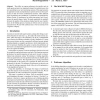Free Online Productivity Tools
i2Speak
i2Symbol
i2OCR
iTex2Img
iWeb2Print
iWeb2Shot
i2Type
iPdf2Split
iPdf2Merge
i2Bopomofo
i2Arabic
i2Style
i2Image
i2PDF
iLatex2Rtf
Sci2ools
119
Voted
ECAI
2008
Springer
2008
Springer
Agents Preferences in Decentralized Task Allocation
The ability to express preferences for specific tasks in multi-agent auctions is an important element for potential users who are considering to use such auctioning systems. This paper presents an approach to make such preferences explicit and to use these preferences in bids for reverse combinatorial auctions. Three different types of preference are considered: (1) preferences for particular durations of tasks, (2) preferences for certain time points, and (3) preferences for specific types of tasks. We study empirically the tradeoffs between the quality of the solutions obtained and the use of preferences in the bidding process, focusing on effects such as increased execution time. We use both synthetic data as well as real data from a logistics company.
Artificial Intelligence | ECAI 2008 | Preferences | Reverse Combinatorial Auctions | Specific Tasks |
Related Content
| Added | 19 Oct 2010 |
| Updated | 19 Oct 2010 |
| Type | Conference |
| Year | 2008 |
| Where | ECAI |
| Authors | Mark Hoogendoorn, Maria L. Gini |
Comments (0)

